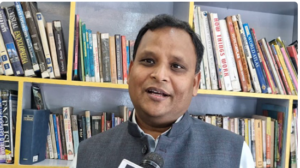Kashmiri artisan keeps centuries old ‘Pulhoor’ tradition alive with govt support
Srinagar (Jammu and Kashmir) [India], March 2 (ANI): The government support is helping a Kashmiri artisan named Muhammad Yousuf Bhat to keep the centuries-old ‘Pulhoor’ (traditional sleepers) alive in the valley.
Yousuf, a resident of Zantrag village in Khrew Pampore uses straws to make not just footwear, but several other items like patij (mats), covers for cups and baskets as well. This art was used by the Kashmiri people in ancient times during the harsh winter season.
Director Handicrafts Kashmir Mehmood Shah told ANI, “The department of Handicrafts Jammu and Kashmir Government is trying hard to preserve these languished crafts as they have started the Handloom Policy in 2020 in Srinagar for the revival of diminishing craft and the revival of this craft is also included in the policy.”
Talking to ANI, Muhammad Yousuf, who is currently working in the Government School of Design Srinagar said that he has learnt this art of making Pulhoor and other items from his forefathers and also thanked the government for making efforts to keep this traditional culture alive.
“Pulhoor was primarily used by people to protect their feet from snow, thrones and pebbles due to the poverty and unavailability of modern footwear,” he added.
Yousuf said that the craft is improving again with the help of proper support from the department of handicrafts and the School of Design are trying to revive this old-aged craft.
“The craft which we are making is using a paddy grass locally known as (Dhaan Gass) and wet water. After that, we make a rope make a traditional mat known as (Pattej) which were used by old people instead of carpets or today’s modern mats,” he said.
He further added saying, “I learned about this art from my father and now the school of designs is helping me to make some products including mats, a traditional rug known as ‘Waggu’ and a centuries-old particular product known as ‘Pulhoor’. It is a kind of shoe made of grass, and was used decades back by people living in far-flung areas to help them on slippery roads after a heavy snowfall during winters.” (ANI)






